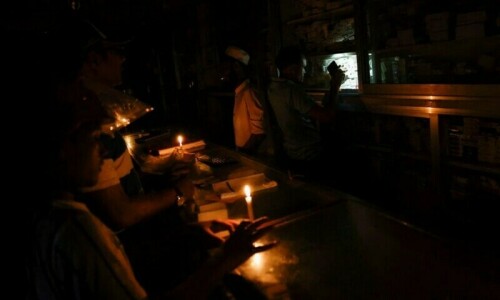CABO SAN LUCAS (Mexico): An ocean away from the most volatile parts of their region, leaders of Pacific rim nations meeting here this weekend are expected to adopt an ambitious US plan to dry up financing for terrorists and strengthen security procedures for air travel and shipping.
The plan would require the 21-member Asia-Pacific Economic Cooperation group, or APEC, to send passenger lists to one another ahead of the arrivals of aircraft and ships. It would also oblige them to inspect shipping containers before they leave for ports in other APEC countries, tighten baggage screening at airports and reinforce cockpits. All are steps the United States is starting to take at home.
A draft of the voluntary accord — awaiting approval by President Bush and the leaders of China, Indonesia, Japan, Mexico and other nations — also pledges to “suppress the financing of terrorism” through better monitoring of charities and nonprofit organizations as well as informal banking networks such as “hawalas”.
Foreign ministers of the APEC countries endorsed the US proposal at a meeting here Thursday but left timing of the measures and other details up to presidents and prime ministers who begin a two-day summit here on Saturday.
US Secretary of State Colin L. Powell called it “a package of bold joint actions to make the flow of trade, finance and communication more secure.” He said the US and other rich countries would help poorer ones pay for the new initiative, which would cost billions of dollars.
APEC’s members include 2.6 billion people and account for nearly half the global economy. The group was formed in 1989 as a trade association for the nations of Asia and the Americas. But its two annual gatherings since the Sept. 11, 2001, hijackings have focused more on terrorism than tariffs.
Last year’s summit in Shanghai came just six weeks after Sept. 11. The gathering at this Mexican beach resort, ringed by warships in the Gulf of California and hundreds of soldiers on shore, comes on the heels of bloody terrorist attacks in Bali, the Philippines and Moscow. South Korean President Kim Dae Jung is coming, but his agenda has been refocussed by North Korea’s recent admission that it has a nuclear weapons programme.
Iraq, too, will be the topic of some discussion as Bush will try, in his meetings with other leaders, to rally support for his strategy against Baghdad.
APEC’s members are Australia, Brunei, Canada, Chile, China, Hong Kong, Indonesia, Japan, South Korea, Malaysia, Mexico, New Zealand, Papua New Guinea, Peru, the Philippines, Russia, Singapore, Taiwan, Thailand, the United States and Vietnam.
Some corporate executives at the summit said the focus here on security is elbowing out critical discussions on trade.
“It’s a shame for those of us who want to push an agenda of free trade and more commerce,” said Nelson Cunningham, managing director of the Washington consulting company Kissinger McLarty Associates. “APEC has been hijacked by the terrorists.”
But US officials said on Friday that the proposed security measures, which are far more specific than APEC’s pledge of counterterrorism cooperation a year ago, will speed legitimate commerce in the long run.
Ambassador Lawrence Green-wood, the top US liaison to APEC, said state-of-the-art inspections equipment adopted in the past year are already helping people and goods move through some US- Canada border checkpoints more quickly than they did before the Sept. 11 attacks. —Dawn/LAT-WP News Service (c) Los Angeles Times













































Dear visitor, the comments section is undergoing an overhaul and will return soon.